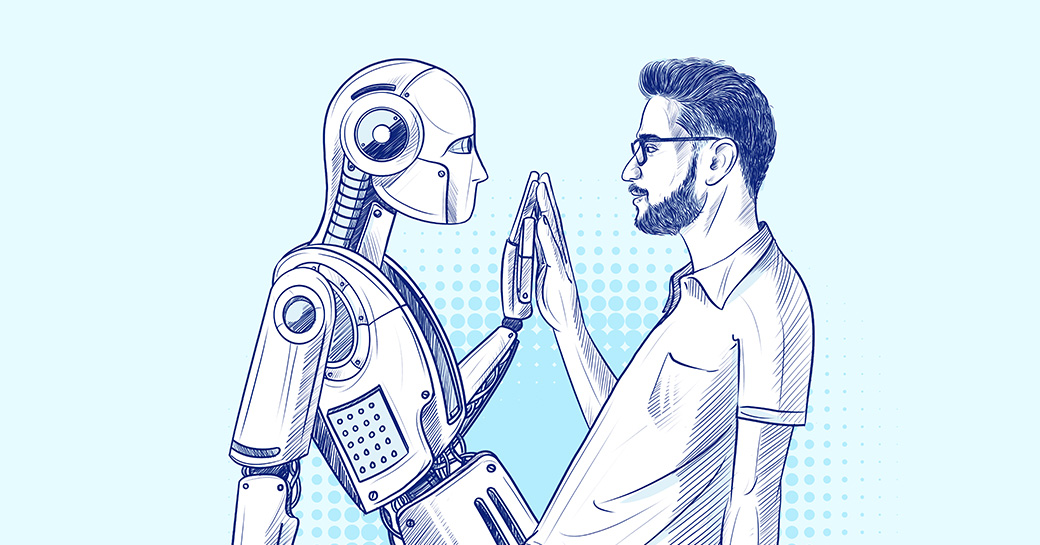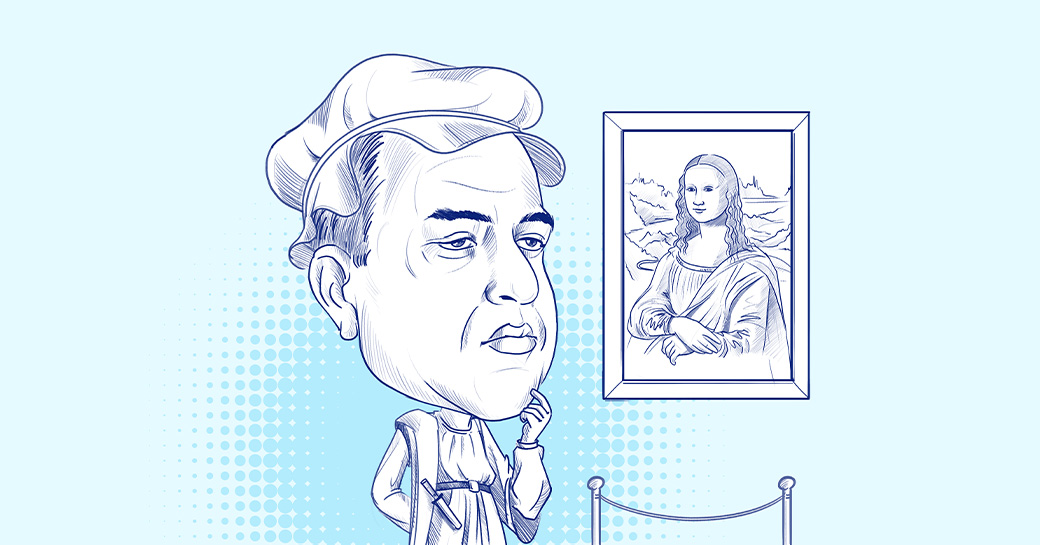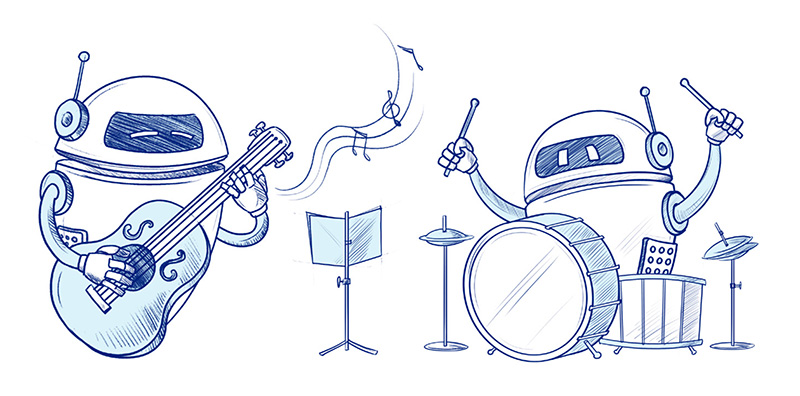Leading the AI transformation of your company
Prof. Gregory LaBlanc, Lecturer, Haas School of Business and Berkeley Law
Watch Now
03:15 Minutes The average reading duration of this insightful report.

Explore the intricate dance of genetic diversity and the power of thought in shaping human evolution. Discover how these fundamental elements intertwine, driving our progress for millions of years, and ponder the future role of AI in this evolutionary journey.
Explore a sneak peek of the full content
There is rapid scientific progress being made towards building artificial intelligence in different modalities (text, images, etc.), and it is hard not to see a future where eventually it will converge into some form of Artificial General Intelligence. If/When it does, I can’t help but wonder how such an intelligence in the future would treat humans. “Would it be empathetic, or would it be dominant?”
Today, in our place in the evolutionary chain, humans have the highest cognitive skills. Due to this, we have chosen a path of dominance. We grow and use life as food, we treat animals as produce in factory lines, we wipe out natural ecosystems to make vain tables and chairs and build fancy homes and factories, we convert fossils to polymers and then dump them in oceans, we introduce chemicals into organic matter without regard to life forms in the soil, and the host of actions is endless. If intelligence means dominance, we are doing a fantastic job.
But this path of dominance is not the universal human path. There is a growing movement towards more empathy towards life forms around us. Preservation of biodiversity, local and organic eating, reduction of plastics, plant-based diets, and free-range farming are just some starting examples of humans with more empathy. I personally believe that empathy is a higher-order intelligence since it is inclusive. Dominance is a historical concept.
I have a companion in my home. She is 6 years old, and she has 4 paws. Her name is Maple. When people use the phrase “pet ownership,” I cringe. I don’t own Maple. How can one life form own another? I am her caretaker and her companion, and vice versa. I want no dominion over other life but rather friendship.
I can understand that the path of empathy is a balancing act since one must weigh the consequences to oneself. However, the path of dominance is also a balancing act since one has to weigh the consequences to other life forms.
There isn’t a right or wrong here, but the question to ask yourself is how would you like a higher form of intelligence to treat you? If you are a fair person, you would want to be treated the way you treat other life forms. It’s an important question since it will inform the lifestyle decisions you make. Download Complete Research
The intricate tapestry of evolution, weaving unique genetic threads into the fabric of life’s endless possibilities.
Credits
Authors@lab45: Arvind Ravishunkar

4:05 Minutes The average duration of a captivating reports.

Explore ten breakthrough technologies poised to redefine human existence, from gene editing and AI to Mars journeys and mind uploading, reshaping our future in unimaginable ways. Dive into this evolution now.
This is the most important question that we will have to answer in this century.
In the last few million years, technology (from stone age tools to computers) has been an enabler for us to lead better lives (i.e lifestyles) and have improved life spans (i.e health). While some technologies have made their way into the human body such as pacemakers, metallic joints, hip replacements, knee replacements, cataracts, etc, most of these technologies have been incremental changes that fix us. Download Complete Research
In the last few years, a suite of new technology breakthroughs are emerging that are going to raise some important questions about how humans will evolve. These technologies are not just enablers but fundamental game changers that will modify what it means to be a human being. They can lead to stronger, faster, more intelligent, more agile and non-terrestrial humans. While some of these technologies exist, some are conceptual.
With gene editing, mind uploading, exoskeletons, general artificial intelligence, non-biological reproduction and martian living, the definition of what it means to be human will be a leading question in this century.

Here we capture 10 such technologies that you will want to keep your eyes on
Credits
Authors@lab45: Arvind Ravishunkar

7:12 Minutes The average duration of a captivating reports.

Dive into the intriguing intersection of AI and human creativity, where generative AI reshapes artistic expression and raises critical questions about its impact on our creative evolution and cultural landscapes.
Human progress and evolution have been fundamentally driven by creativity and diverse thought, fostering vibrant cultures and shaping societal values. Creativity, serving as a catalyst for innovation and discovery, allows us to transcend conventional boundaries. However, the integration of Generative AI (Gen-AI) in our lives brings a critical concern: could it enforce creators' biases and limit human originality, steering us towards uniformity in thought and progress? The reliance on Gen-AI potentially risks ceding control over our ideas and thoughts to AI, posing a threat to our societal evolution and the richness of human creativity. Download Complete Research

Creativity, a hallmark of human uniqueness, encompasses the generation of inspiring and innovative ideas across various domains like language, music, art, and literature. It's deeply rooted in human intuition, experience, and consciousness, allowing for the creation of meaningful, emotionally resonant works. The emergence of generative AI tools, however, has sparked debate over their impact on human creativity. These AI systems, lacking human emotions and motivations, face limitations in replicating the depth and authenticity of human creative expression. This technological advance prompts a critical inquiry into the future of human societies and creativity in an AI-dominated era, raising concerns about potential shifts towards a one-dimensional societal and creative landscape. Download Complete Research
Music, a profound expression of human emotion and creativity, transcends mere words, connecting deeply with the soul. Historically, musicians have infused their unique experiences into creating emotionally rich and impactful music. With the advent of Generative AI, such as Amper Music, the landscape of music creation is evolving, offering the ability to produce complex, bias-free compositions. However, this technological advancement raises significant concerns. Overreliance on AI in music may lead to a loss of personal artistic voice and emotional depth, potentially resulting in music that, while technically proficient, lacks the soulful essence that defines human creativity. This development in AI challenges our understanding of creativity and its role in human expression, questioning the true nature and future of art in the AI era. Download Complete Research
Generative AI, utilizing Reinforcement Learning with Human Feedback (RLHF), crafts music based on user preferences. This approach, while seemingly innovative, risks diluting the authentic, soul-driven creativity of musicians. Platforms like Spotify, leveraging user data to guide music creation, inadvertently promote a feedback loop that may constrain the multi-dimensional nature of music to a unidimensional, trend-driven form. This trend-centric approach can stifle the unique, deeply emotional, and complex expression inherent in human-composed music. By prioritizing popularity and trends over the intrinsic creative impulse, AI in music creation potentially impedes the evolution of genuine artistic expression and, by extension, cultural and human evolution. The reliance on AI for music creation underscores a crucial debate: the balance between technological innovation and preserving the unfiltered essence of human creativity. Download Complete Research
Generative AI tools are reshaping our approach to self-discovery and creative exploration. Traditional experiences, like exploring a bookstore's diverse offerings, are contrasted with AI-driven online recommendations that often confine users to their past preferences, narrowing their exposure to new ideas and genres. This constrained exploration can potentially limit human creativity and innovation. The rise of AI, while offering democratized access to creative tools, also risks diminishing our imaginative capabilities by fostering dependencies. To harness AI's full potential without undermining human creativity, a balanced, collaborative approach is essential. Combining human intuition, experience, and innovation with AI's capabilities can lead to empowered, enriched creative processes. Emphasizing the need to maintain human creativity at the forefront, the article advocates for using AI as a complementary tool, enhancing rather than replacing human creativity and imagination. Download Complete Research
Credits
Author@lab45: Nagendra Singh
This is your invitation to become an integral part of our Think Tank community. Co-create with us to bring diverse perspectives and enrich our pool of collective wisdom. Your insights could be the spark that ignites transformative conversations.
Learn MoreKey Speakers
Thank you for subscribing!!!
